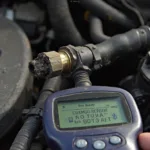OBD2 tuning boxes promise increased horsepower and better fuel economy, but do they live up to the hype? This is a common question among car enthusiasts, and in this article, we’ll delve deep into the world of OBD2 tuning boxes, exploring their functionality, potential benefits, drawbacks, and ultimately, whether they’re worth the investment.
Understanding OBD2 Tuning Boxes
OBD2 tuning boxes are small electronic devices that connect to your car’s OBD2 port, typically located under the dashboard. They modify data transmitted between the car’s ECU (Engine Control Unit) and various sensors, altering parameters such as fuel injection timing, boost pressure, and air-fuel ratio. The goal is to optimize engine performance for increased power and potentially improved fuel efficiency. But is this manipulation truly beneficial?
Manufacturers often make bold claims about their products, promising significant gains. However, the actual impact of an OBD2 tuning box can vary greatly depending on factors like the car’s make and model, the quality of the tuning box, and even driving habits. It’s crucial to approach these claims with a healthy dose of skepticism and conduct thorough research before making a purchase.
The Potential Benefits and Drawbacks
While some users report positive experiences with OBD2 tuning boxes, it’s essential to understand both the potential benefits and the inherent risks. One potential benefit is indeed an increase in horsepower and torque, leading to a noticeable improvement in acceleration and overall driving performance. However, these gains are often less dramatic than advertised and may only be apparent under specific driving conditions.
Some manufacturers also claim improved fuel economy. The logic is that by optimizing the engine’s performance, the car burns fuel more efficiently. However, this is often debated, and some studies have shown negligible or even negative impacts on fuel consumption. The actual impact on fuel economy heavily depends on driving style and the specific tuning box used.
One significant drawback is the potential risk of voiding your car’s warranty. Modifying the car’s ECU parameters can be detected by the manufacturer, and if a malfunction occurs that’s linked to the tuning box, they may refuse to cover repairs under warranty. This is a crucial consideration, especially for newer vehicles.
Another concern is the potential for engine damage. By altering the engine’s parameters beyond the manufacturer’s specifications, you could be placing undue stress on various components, leading to premature wear and tear or even catastrophic failure. This is especially true for low-quality tuning boxes that don’t provide accurate adjustments.
How to Reset OBD2 Monitors after using a Tuning Box?
If you decide to remove your tuning box, it’s often necessary to reset the OBD2 monitors. This will clear any stored trouble codes and allow your car to return to its factory settings. You can learn more about this process in our article on how to reset obd2 monitors.
Maryland OBD2 Emissions Requirements and Tuning Boxes
Using a tuning box can also affect your vehicle’s ability to pass emissions tests, particularly in states with strict regulations like Maryland. It’s important to be aware of the md obd2 emissions requirements before installing a tuning box.
Are OBD2 Tuning Boxes Worth It?
The question of whether OBD2 tuning boxes are worth the investment is complex and depends heavily on individual circumstances. For those seeking significant performance gains, a professional ECU remap is often a safer and more effective solution. While OBD2 tuning boxes may offer a slight boost in power and potentially some improvement in fuel economy, the risks associated with warranty voidance and potential engine damage should be carefully weighed.
Conclusion
OBD2 tuning boxes can offer a tempting shortcut to enhanced performance, but the reality is often more nuanced. While some users report positive experiences, the potential risks and limitations must be considered. Before investing in an OBD2 tuning box, research thoroughly, understand your car’s specifications, and weigh the potential benefits against the potential drawbacks. Do OBD2 tuning boxes really work? Sometimes, to a degree, but proceed with caution.
FAQ
- What is an OBD2 tuning box? It’s a device that connects to your car’s OBD2 port to modify engine parameters.
- Do tuning boxes increase horsepower? They can, but the gains are often less than advertised.
- Can tuning boxes improve fuel economy? The impact on fuel economy is debatable and can vary.
- Will a tuning box void my warranty? It could, as it modifies the car’s ECU.
- Can a tuning box damage my engine? Yes, especially low-quality or improperly installed ones.
- Are there alternatives to tuning boxes? Yes, professional ECU remapping is a more reliable option.
- Should I use a tuning box on a leased car? Generally, it’s not recommended as it could void the lease agreement.
Common Scenarios and Questions
- Scenario: My car feels sluggish. Will a tuning box fix it? A tuning box might offer a small improvement, but it’s crucial to investigate the underlying cause of the sluggishness.
- Question: Can I install a tuning box myself? While technically possible, professional installation is recommended to avoid potential issues.
Further Reading
For more information related to OBD2, check out these resources:
Need Support?
Contact us via WhatsApp: +1(641)206-8880, Email: [email protected] or visit us at 789 Elm Street, San Francisco, CA 94102, USA. Our customer support team is available 24/7 to assist you.


